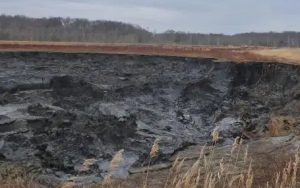 Among news of federal regulations being scaled back and reports of the drastic climate change situation, it’s nice to hear about a state taking action to protect the environment. This summer, Illinois did just that. Governor Pritzker signed the Coal Ash Pollution Prevention Act, which protects Illinois residents and the environment from the dangerous effects of toxic coal ash.
Among news of federal regulations being scaled back and reports of the drastic climate change situation, it’s nice to hear about a state taking action to protect the environment. This summer, Illinois did just that. Governor Pritzker signed the Coal Ash Pollution Prevention Act, which protects Illinois residents and the environment from the dangerous effects of toxic coal ash.
So, what’s coal ash and why is it dangerous? Coal ash, also called “coal combustion residuals,” is the group of byproducts produced from burning coal. The byproducts include waste from each process in the coal plant, like “bottom ash” sitting at the bottom of the coal furnace and “fly ash” that’s captured going out the smokestacks. Coal ash is one of the largest types of industrial wastes in the United States. Nearly 130 million tons of coal ash was generated in 2014. About one-third of coal ash is recycled, but the majority is either dumped into landfills at the power plants or mixed with water and put in “ponds” behind earthen walls.
Coal ash can be incredibly dangerous to humans and the environment. Depending on where the coal was mined, coal ash can contain heavy metals, such as arsenic and lead. If you eat, drink, or inhale them, heavy metals can cause cancer and nervous system malfunctions, such as developmental delays. They have also been linked to kidney disease, reproductive problems, heart damage, lung disease, birth defects, and impaired bone growth. When coal ash is improperly disposed of, in coal ash ponds that lack protective liners, for example, it can leach into the water, carrying toxic substances into drinking water supplies. Over 100 communities nationwide have been impacted by coal ash leaching. Some impacted communities in Illinois include Waukegan and Peoria.
Illinois’ Coal Ash Pollution Prevention Act is definitely a step in the right direction for protecting communities and the environment. It will hopefully result in stronger rules for coal ash cleanup, as well as fund cleanup programs through permit fees. The Act also requires performance bonds to ensure that companies set aside the money to close and clean up coal ash ponds. Illinois desperately needed this law, since a recent report found widespread heavy metal pollution in the groundwater surrounding 22 of the state’s 24 coal ash dumps, including arsenic, cobalt, and lithium pollution. Luckily, now that the bill became law, the Illinois Environmental Protection Agency (IEPA) can begin proposing rules to regulate coal ash disposal. That rulemaking process will allow community members to comment on what IEPA proposes. (Want to leave an effective comment? Learn how here.). Hopefully, the IEPA will stand up for impacted communities by proposing and implementing strict rules on coal ash disposal.
Now that Illinois is taking great strides to reduce coal ash pollution, it’s time for the federal government to follow suit. The U.S. EPA recognizes that coal ash contains dangerous contaminants that, “without proper management…can pollute waterways, groundwater, drinking water, and the air.” However, instead of cracking down, the EPA’s latest amendment to the coal ash regulations gives the coal industry a break, including relaxing shut down requirements when a coal ash disposal site is leaching. This is unacceptable! It is time for the federal government to step up and start protecting people and the environment.
Even though Illinois is heading in the right direction, many people are still at risk of illness associated with coal ash contamination. If you believe you or your family has been impacted by groundwater contamination from a coal ash dump, please call our environmental attorneys for a free and confidential consultation at 630-527-1595. Our legal team can help you determine if you have a case.
Blog written by Dayna Smith.
 Illinois Personal Injury Lawyer Blog
Illinois Personal Injury Lawyer Blog


